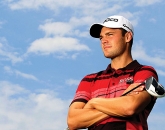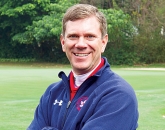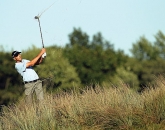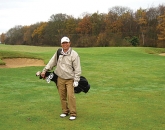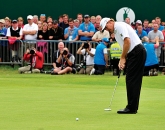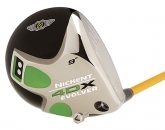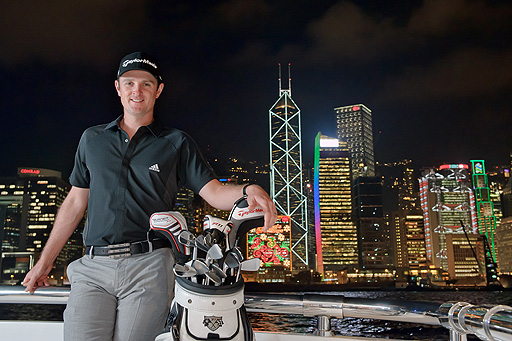 He came, he saw and he didn't quite conquer, but Justin Rose lent some undeniable star quality to December's UBS Hong Kong Open, an event he was playing in for the very first time.
He came, he saw and he didn't quite conquer, but Justin Rose lent some undeniable star quality to December's UBS Hong Kong Open, an event he was playing in for the very first time.
Coming one week after Rose and reigning Hong Kong Open champion Ian Poulter finished in second place in the Omega Mission Hills World Cup, the South African-born Englishman had been heavily fancied to excel on his Fanling debut. Rose is one of the finest iron players in the game and the Hong Kong Golf Club, with its small putting surfaces, places a premium on ball striking.
Unfortunately for Rose, who captured the BMW Championship, the first of the FedEx Cup playoff events, in September, he was unable to get out of second gear and ended up missing the cut by a shot. It was a disappointing showing by the world number 20 but he took it on the chin and handled his official duties as one of the tournament's biggest attractions with the kind of gentlemanly aplomb that has made this very likeable 31-year-old a favourite with sponsors, galleries and Pro-Am partners alike.
Of course Rose is no stranger to facing adversity and coming through it with flying colours. In 1999, at the Open Championship at Royal Birkdale, Rose announced himself to the world with a fourth-place finish when still an amateur. It was a staggeringly mature showing, one that many thought would catapult the then 17-year-old to the top of the game's hierarchy as a professional. Twenty-one missed cuts in a row in the immediate aftermath put paid to that theory, but Rose is nothing if not a fighter and he battled back from that ignominious start to his career to pick up titles and climb the rankings over the next few seasons. Eight years after Royal Birkdale, in 2007, Rose became Europe's number one player after a thrilling victory at the Volvo Masters.
Concentrating his efforts Stateside, Rose made his so far only Ryder Cup appearance the following year, collecting an impressive three points from four matches, in Europe's loss to the US at Valhalla. That performance, combined with two impressive wins on the PGA Tour in 2010, including a victory at Jack Nickluas's Memorial Tournament, made him heavily fancied to receive one of Colin Montgomerie's wildcard picks for the matches at Celtic Manor. The pick didn't materialise – both he and compatriot Paul Casey were controversially left out of the proceedings in favour of Padraig Harrington and Luke Donald – but again Rose put that disappointment behind him to enjoy another fine season in 2011.
Onwards and upwards could be Rose's mantra and he's already off to a fine start in 2012: in January his wife Kate gave birth to their second child, a baby girl named Charlotte. With what appears to be a blissful family life all he needs now to help fulfil his professional ambitions is a major, which he says he is close to achieving, and a place in José María Olazábal's Ryder Cup this September in Chicago. The motivation is clearly there.
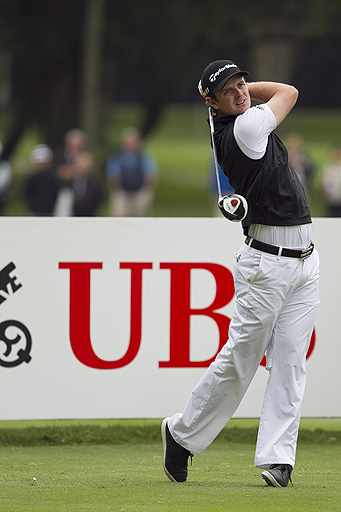
This was your first proper visit to Hong Kong. What did you make of it?
It's a wonderful city, with a lot going on. It's got a great vibe. There's a wonderful balance of culture and it's a fun place to be. Hong Kong was much bigger and more wide reaching than I was expecting. After the Open I went to Clearwater Bay Golf & Country Club. What a spectacular property! I thought the golf courses were going to be jammed up against buildings.
The UBS Hong Kong Open has become one of the most popular events on the European Tour. You didn't have the best of times on the course perhaps, but what aspects of the tournament did you enjoy?
Fanling is an amazing course and I would have loved to have been there for the weekend. The conditions made things tricky; sneaky tricky. I kept missing it in the wrong spot, which made it hard to get up and down, especially with the rough around the greens. I need to learn and to get to know the place more. The course had teeth, with the wind and firm greens. It caught me by surprise a bit.
Were there any more surprises?
Before arriving I didn't realise it was a composite course. Fanling felt different than how I had seen it on TV, much in the same way as Augusta. I thought the fairways were going to be more tree-lined and narrow than they actually are, which would make it more of a driving test, but I found it to be a second shot golf course. You need a great iron game to make birdies. There are some tough holes – number eight was one and the 18th, which is a great finishing hole, an intimidating finishing hole, was another.
So it begs the question, will you return this year?
As far as coming back in 2012 is concerned, I'll look at the schedule. The Hong Kong Golf Club is a course I should play well, it should be right in my wheelhouse.
You played with your good friend Ian Poulter at the Omega Mission Hills World Cup, where you finished second. Presumably you enjoyed the partnership?
Very much so. Ian, being the highest ranked English player after Luke Donald and Lee Westwood weren't able to play, got to pick his partner – and he picked me. He was tongue in cheek about it and offered a 60/40 split of the prize money. When it came to the event I was actually ranked higher than him and laughingly offered him the same 60/40 deal but in my favour. We always have a lot of good banter. We've had a good relationship through the years. We shared rooms together on the Challenge Tour in 2000 and 2001, so we've known each other a long time. It's good in the format we played – we don't have to say 'sorry' to each other. The path each of us took to becoming pros was completely different, so it just goes to show that the amateur rankings don't tell the complete story when it comes to the professional game.
But it would be safe to say you have a different personality to him. You're not a flamboyant character ...
You have to be authentic and true to yourself. You have to make yourself happy, not the press. I would like to be known as a gentleman champion, to let the clubs do the talking. I'm a big believer in keeping your emotions in check: celebrate the good shots but don't give life to the bad shots. I do make fist pumps and I do get excited about doing good things. You should show people you are excited to win. I'm a laid-back person and I try to be humble because this game has humbled me.
In September you won the BMW Championship on the PGA Tour. What did you learn about your game and your mental abilities that week?
I had a great understanding of what was required. For instance, at the 71st hole I had a one-shot lead over John Senden and was just off the green but it was a makeable chip. I was having an internal dialogue with myself, saying I could hole it. And I did! It was the nail in the coffin. My strategy and game plan was fantastic that week. I never panicked, didn't get frustrated and never lost my cool once. It was four days of great thinking and staying in the moment. It was exciting and enjoyable just to have another day to go out and be excited.
Have you enjoyed the spotlight since becoming a multiple winner of the PGA Tour? Have you enjoyed the spotlight?
The media has been on me since I was an amateur. 2011 was a validation year. In 2002 I won four times; in 2007 I won the European Tour Order of Merit; in 2010 I won twice on the PGA Tour and in 2011 I won. I was able to back up a good year with another good year. That's what I'm after – consistency. And a major!
It seems that since you first won on the PGA Tour the floodgates have opened. Can you put your finger on what has led you to success after several years of not closing on opportunities?
Absolutely, 100 per cent. I have great people around me and I've been implementing the lessons I've learned. In the past I wasn't learning, I wasn't using the information I had to be proactive about it. It's about being smart, which is a maturing process and something that came to me when I reached my 30s. I'm beginning to figure out how to prepare properly.
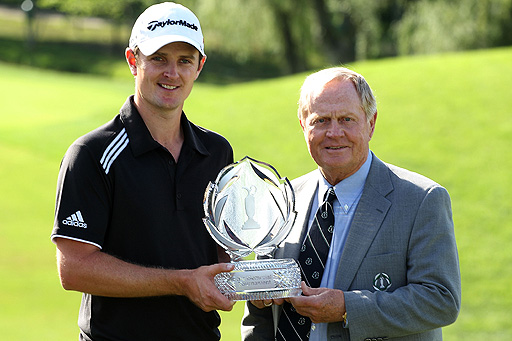
You won Jack Nicklaus's tournament, the Memorial, in 2010. Where does that rank among your career achievements?
Winning the FedEx Cup event [the BMW Championship] is bigger on paper but the Memorial is a full-field event and because it's Jack's event it has an extra importance to the players. It was great to have my first win at his course. It's my most enjoyable tournament. I bumped into Jack at Royal Birkdale in 2008 and he told me I could win. To have him in the press conference, having him on my side, after I'd won was very special.
You've had top 10s in all the majors but your best result remains the 1999 Open Championship when you finished fourth as an amateur. Do you feel you're close to a win?
I do. Majors test all parts of your game. You've got to be high up in the greens in regulation statistics, you need a good mental game, good at scrambling, good out of bunkers. Statistically, from 75 to 200 yards I'm a great iron player and I'm improving in all other areas, so I'm feeling good about it. In the past I think I've probably tried to be too perfect. But winning majors is about managing your mistakes. You can miss some greens, as long as you've got a great short game.
How motivated are you to make the European Team for this year's Ryder Cup?
I played in 2008 and loved it and never want to miss it. It has an amazing history, an amazing rivalry between the two teams – and it's a big deal. I thought I had done enough to make the team in 2010. and the assistant captains said I was looking good and not to worry, so to get left out at the last minute was disappointing. But, really, you only have yourself to blame if you don't make the team. To play for [captain] José María Olazábal would be an honour. They changed the qualification so that the top five on the European Tour list and the top five from the world rankings make the team. If there was only one category then I would add events to my schedule.
Why do you think Montgomerie passed on giving you a wildcard when you were clearly playing well?
Here's what happened. I was at The Barclays, two shots off the lead and playing well. I was told Monty would call me before my tee time. Ten minutes before I'm due to play my phone rings and Monty tells me they've gone another way and I'm not going to get picked. All I could say was, "I'm teeing off in 10 minutes." It took every bit of energy to play and I kept replaying in my mind what had just happened. Padraig Harrington was playing on the course with Paul Casey and Padraig's wife gets the call saying he's in. She gives a thumbs-up to Padraig. Paul figures out what's going on but gets no indication from anyone about his own position; he assumes [correctly] that he didn't get picked. Luke Donald was seven-under through nine holes and gets the message that's he's made the team. He then goes six-over on the back nine. He played with it on his mind. It was a disruptive day. Paul was ranked number eight in the world, has a stellar Ryder Cup record and is known as the match play king. There was a lot of head scratching going on.
Are there any areas on the business side of golf that you have an interest in?
If I wasn't a golfer I would liked to have been an architect, to put something down on paper and bring an idea to life. For that reason golf course design really interests me. To have a piece of land and to be able to transform it into something you've envisaged would be something to be really proud of.
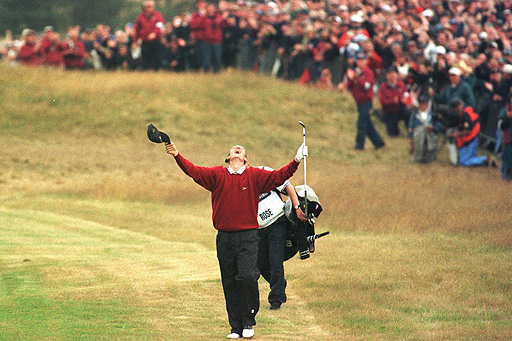
Click here to see the published article.


